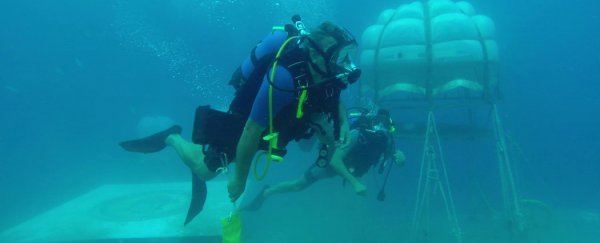It sounds like something out of a science fiction film, but experimental underwater biospheres off the coast of Italy are being used to grow crops for human consumption, and the project could lead to the development of all kinds of eco-friendly solutions for farming in the future.
Nemo's Garden in Noli, Italy, is the brainchild of Sergio Gamberini, the president of an Italian scuba gear company. While holidaying a few years ago, the diving-obsessed executive struck upon the idea of growing crops under the sea, with the goal of using the natural, plant-friendly properties of the ocean environment to encourage horticulture in 'underwater greenhouses'.
With the help of his company's resources, Gamberini constructed his labour of love six metres under the sea, sinking vast empty balloons under the surface and anchoring them to the sea floor, then blowing them up with air to create a suitable, oxygenated atmosphere for crops including basil, beans, lettuce, and even strawberries.
"I try to do something that's a little different and to show the beauty of the ocean," Gamberini told Robert Gebelhoff from The Washington Post. "I hope to do something for the young people and to inspire new dreams."
And don't worry, there's no sign of Jar Jar Binks or any of his Gungan compatriots within the biospheres of Nemo's Garden, but that's not to say the underwater domes are devoid of conscious life forms. On the contrary, the project has attracted the curiosity of much local sea life, including crabs, seahorses and even octopuses (proving Ringo was onto something all along).
But while the constant temperatures and natural evaporation inside the biospheres create optimal plant-growing conditions with greenhouse humidity and high levels of carbon dioxide, the ocean also brings with it destruction in the form of rough seas and underwater storms capable of destroying the harvest.
"It's been a learning curve," said Luca Gamberini, Sergio's son. "We completely lost the crops four times, but it didn't really matter because we have such great growth rates."
The divers are looking to refine and optimise their underwater farming experiment with an ultimate view to crowd-funding a home aquarium kit to give people the opportunity to try out the techniques wherever they are. The idea is to see them immortalised as the pioneers of a new kind of eco-friendly undersea crop production in areas where land-based crops aren't viable.
"In the future, it'll definitely be something that's economically sustainable," Luca Gamberini said. "I see possibilities for developing countries where harsh conditions make it difficult for plants to grow."
